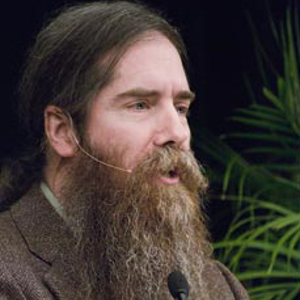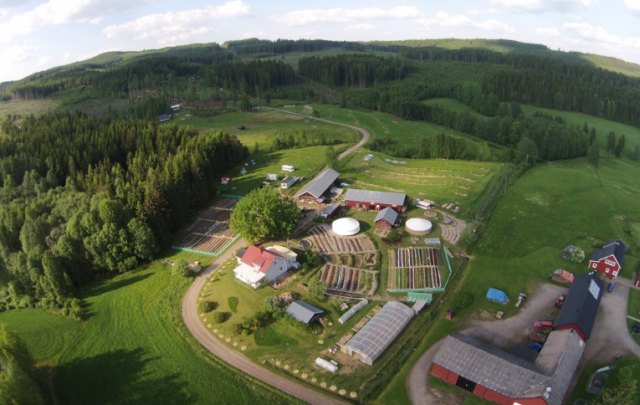I sometimes wonder what historians of the far future will think as they pore over what’s left of the records of our own time. It’s unlikely that they’ll have a great deal more to go on than, say, Renaissance scholars had when they started to piece together the story of Rome’s decline and fall; our civilization produces a much greater volume of records than Rome did, to be sure, but most of them are in much more transitory forms; parchment lasts for many centuries if it’s kept dry and not handled much, while a few decades at most—and in the case of the internet, a few seconds of power loss—is enough to silence most of our current information media forever.
It’s all too easy to imagine a historian of the Ecotechnic Renaissance in something like the twenty-ninth century in our calendar as she pores over the surviving records of ancient America, trying to figure out what brought about the decline and fall of that long-vanished civilization. Our historian has collected an admirable collection of sources, not only handprinted volumes from the scholarly presses of her time but manuscripts, some of them centuries old, laboriously copied by hand from ancient originals. By the pale light of a single electric lamp, she opens one of the big leatherbound volumes, and begins to read.
We’ll assume that her time is more fortunate than it may well be, and the texts available to her aren’t limited to tabloid-style biographies, press releases by ancient American politicians, and those wretched ghostwritten volumes that ancient American politicians get their flacks to churn out to boost their chances of a presidential nomination. Our historian, let’s say, has a few books that sketch out the crisis of industrial civilization. Here’s a rare manuscript copy of The Limits to Growth, courtesy of a long line of scribes in an ecostery in Vermont; here’s the scholarly find of the last half-century, an almost-complete text of Overshoot by the ancient sage William Catton, which lay forgotten in an abandoned library in the Nebraska desert until shepherds discovered the building half buried in the sands; here’s a volume of texts written by another ancient sage named Sharon Astyk, whose works are all lost but were quoted at length by half a dozen writers of a later century whose writings do survive.
Our historian has these and a few more like them, let’s assume, and she also has enough in the way of chronicles and histories to trace the curve of decline that brought industrial civilization to its knees—the political crises and economic implosions, the depletion of concentrated energy sources and the abandonment of energy-intensive lifestyles and technologies that followed, the wars and epidemics and famines, and the shifts in climate and sea level as the earth’s biosphere responded in its own good time to three centuries of frankly brainless human tinkering with the natural processes that keep us all alive. So there she sits at her desk, the pool of light cast by her single light bulb setting the leather bindings of her books aglow, with the wop-wop-wop of the wind turbine that powers the lamp faintly audible through the ceiling as the night winds sweep past. What is she thinking as she surveys our fate?
I may be wrong, but I’ve long thought that one question above all would haunt my imagined historian of our future: why did we do it? Given that our entire civilization had plenty of warning, and that ten minutes of unprejudiced thought ought to have been enough to demonstrate to anybody the absurdity of expecting to get away with infinite economic growth on a finite planet, why didn’t we do what must, to the eyes of the future, look like the obviously right decision, and downshift to a less energy- and resource-intensive steady state economy while we had the chance? Why, instead, did we keep on lurching blindly forward on a one-way street headed straight to history’s compost bin, all the while angrily shouting down the few that tried to warn us of where we were going?
It’s a question that a lot of people in the peak oil community ask themselves right now, and for good reason. To those who’ve grasped the hard physical realities that undergird peak oil—the geological and thermodynamic limits to our planet’s fossil fuel supplies, the net energy issues and energy subsidies that make replacement of fossil fuels so challenging, and the rest of it—the arguments generally marshalled against the reality of peak oil look like bizarre exercises in paralogic. Weirdly, too, when those paralogical arguments fail—when the insistence by economists that the supply of oil will always increase with rising prices, for example, collides with the reality that the price of oil has increased drastically since 2004 without any corresponding increase in supply—nobody stops and asks the questions that seem obvious to those of us who are already on the peak oil bus.
One of the better recent examples of this last odd habit can be traced in the media response to Daniel Yergin’s latest broadside against the concept of peak oil, framed in his new book The Quest. I don’t propose to argue with Yergin’s claims here, as that’s already been done elsewhere in the peak oil blogosphere. What’s interesting to me is that Yergin has made a series of highly public predictions about future oil production rates and prices over the last decade or so, and to the best of my knowledge every single one of them has been wrong—not slightly wrong, but wrong on the grand scale. His 2004 prediction that the price of oil would shortly stabilize at a plateau of $38 a barrel was so widely publicized, and so decisively refuted by events, that some peak oil writers took to calling this amount of money “one Yergin” and noting how many Yergins a barrel of oil was bringing on any given day.
As a forecaster, then, Yergin’s not even as reliable as a broken clock, and yet the media continue to take his predictions at face value. As far as I know, not one of the reporters in the mainstream media who breathlessly repeated Yergin’s claims about the impossibility of peak oil took so much as a sentence to refer to any of his past predictions, much less how they turned out. It’s weirdly reminiscent of the acquired amnesia that enables believers in apocalyptic prophecies to forget the last half dozen times they talked themselves into believing that the Rapture or the arrival of the Space Brothers or whatever was imminent, and treat the latest prediction with the same earnest enthusiasm.
There’s a certain amusement value in this, but other manifestations of the same gap in comprehension between those who recognize the reality of peak oil and those that don’t are far from funny. Marriages have broken down and friendships have ended because of it. Many other relationships exist in a state of armed truce, in which nobody brings up peak oil because it’s already become clear that conversation on the subject leads nowhere useful. The division is not a matter of intelligence—some extremely smart people insist that there must be limitless energy somewhere—or politics—those who reject peak oil, like those who understand it, can be found from one end of the political spectrum straight across to the other. When it comes down to it, the most that can be said is that some people get peak oil, and others simply don’t.
My sense—and it’s here that we circle back around to the theme of the last two posts, the interface between magic and peak oil—is that the difference between the minority that get peak oil and the majority that doesn’t is not rational in nature. I’ve spoken at quite a bit of length in past posts about the ways that the modern belief in progress functions as a religion, a mythology, a narrative on which most people in the industrial world found their sense of meaning and their hopes for the future. Still, there’s another way to talk about it, and to do that we need to turn back to Plato’s metaphor of the horses and the charioteer, which I mentioned in last week’s post.
That metaphor fielded some lively responses over the past week, and what I found interesting is that most of them missed a central aspect of it. A number of my readers interpreted it along lines that have been standard in the Western world for some centuries now, and seen the horses as the body and its instinct, and the charioteer as the mind and its reasoning powers. That’s the traditional schism dividing Classicism, which exalts reason, from Romanticism, which exalts instinct; from the end of the Renaissance right up to the present, that split has been a standard trope in our culture, and so it’s not surprising that people assumed that this is what Plato was talking about.
But this was not what Plato was talking about, not by a long shot. In his metaphor there were two horses, not one, and they corresponded to two very different forces in the nonrational side of the self. One horse represents the biological self, guided by what Romantics call the instincts and Platonists have generally called the appetites. The other horse, though, represents what the ancient Greeks called thumos, the spirited or irascible part of the self, the part that responds nonrationally to praise or blame, that responds to insults with unreasoning anger and to the promptings of pack-loyalty with the kind of blind courage that shrugs at the thought of death. To use a phrase Plato didn’t, where the first horse is the biological self, the second horse is the social self.
This second horse embodies the lessons we all learn from our parents, our peers, and our community in the childhood years before the ability to reason clearly emerges. It’s as potent a force as the biological appetites, and tangles up with them in complicated ways—the intricacies of the sex drive, for example, have a good deal more to do with the social self and influences absorbed in childhood than they do with the relatively simple biological drive to mate. In evolutionary terms, the social self—or more precisely, the capacity to develop a social self—is a good deal older than the rational mind; we share it with the whole range of mammals that live in groups, and more especially with social primates such as chimps and baboons; it’s nonrational and nonverbal, and once a pattern is established in the social self, it’s no easier to change it by rational thought than it is to turn the sex drive on and off the same way.
The social self is also one of the main vehicles of magic. I wrote two weeks ago about the extent to which human social interactions are mediated by nonverbal and nonrational communication—body language, gesture, vocal tone, facial expression, and all the other communicative methods we have in common with our mammal relatives. These are the channels of communication through which people fall in love, make friends and enemies, establish their place in social hierarchies, claim a larger or smaller share of whatever resources are to hand: all the things that baboons and beavers and the rest of our nonhuman kin do with comparable signals sent through comparable channels. Baby baboons and beavers pick up facility in this language in their early years, and no doubt absorb all kinds of lessons about their social and physical environment through the same means; so do we.
What makes this natural process a fertile source of problems is that we apply these nonrational cues to words that also denote rational concepts, and then confuse the two. Watch the way people talk about a political concept central to their society’s self-image: for example, the concept of democracy here in America. The social self, that unruly horse, insists that democracy—”real democracy”—ought to live up to standards that no real political system can achieve. What ought to be called “real democracy” is the cumbersome, corrupt, flawed, but functional system that emerges when real human beings have the right to elect officials and vote on issues. Still, that’s not how the horse sees it; to the horse, democracy is an emotionally charged symbol rich with warm feelings, and “real democracy” means that symbol in some impossibly perfect manifestation on the plane of everyday life.
I’d like to suggest that this is what underlies the paralogic that makes peak oil incomprehensible to most people in the industrial world just now. The concept of progress is, if anything, more heavily loaded with positive emotional energy among us than the concept of democracy, and around it gathers a flurry of other concepts equally freighted with warm emotions. Challenge it—and the concept of peak oil, if it’s taken seriously, challenges it to the core—and the social self takes fright and shies away, dragging the chariot and the charioteer with it, and quite possibly spooking the other horse and sending the whole kit and caboodle careening down the nearest blind alley. (Murmuring “drill, baby, drill” to the social horse seems to calm it, which probably explains the popularity of that ritual chant just now. )
This is not a new thing, of course, and it’s something that operative mages—people who practice magic—have had to deal with in themselves and their students for a very long time. Operative magic requires the mage to be able to think about the world in ways that aren’t supported or encouraged by his or her society, and getting the social self and the reasoning mind untangled from each other is an important part of that process. The standard approach to making this happen in traditional Western magic is summed up by the term “initiation.”
There’s been plenty of nonsense written about initiation down through the years, but the basic concept is easy enough to grasp. The symbolic and ritual tools of magical practice can be used to set off the same set of reactions that allow a child, or for that matter a baby baboon, to stock its social self with the nonverbal and emotionally charged patterns of its social group. This is done in a careful and controlled way, with patterns that further the process of magical training, and the candidate—the person going through the initiation—is taught nonverbal signals that allow him or her to activate the new patterns when it’s time to use them, and deactivate them when it’s time to deal with the nonmagical world. In the short term, this makes it possible to practice magic without too much psychological strain; in the long term, the experience of shifting from one set of arbitrary social patterns and emotional charges to another teaches the reasoning mind to detach itself from the social self altogether, and think its own thoughts rather than those of its society.
Those of my readers who haven’t been through a magical initiation, or one of the lodge initiations (for example, those of Freemasonry) that use similar methods for the purpose of self-improvement and ethical development, may well think they have no idea what I’m talking about. Still, if you’re reading this blog and consider peak oil a real possibility, you’ve already passed through an initiation. It didn’t happen in a lodge of the Ancient Hubbertian Order of Peak Oil, granted, but there’s another kind of initiation, and that’s self-initiation.
In a regular lodge initiation, the candidate goes through a dramatic ceremony, and is then given a set of meditative and ritual exercises to practice; these are meant to reinforce the pattern communicated in the initiation ritual. The practitioner of self-initiation skips the ceremony, or does an abbreviated form of it on his or her own, and then plunges straight into the meditative and ritual exercises to get the same effect. Some magical schools prefer to use self-initiation, since it quickly weeds out those who aren’t willing to do the hard work that magic requires. Other schools avoid it, but it’s a widely used method, and a great many of you have been through it whether you’re aware of that fact or not.
Think back, dear reader, to the time when you first became aware of peak oil. Odds are that when you first encountered the concept, you found it disquieting or even repellent, but at a certain point—maybe in that first encounter, maybe later on—something suddenly shifted. A moment later you were living in a different world, one in which earlier priorities and beliefs had to make room for the immense and terrifying fact that your civilization was in deep trouble and next to nobody was willing to see that, much less do anything about it. That was your initiation into peak oil, and the feverish reading and thinking that most of you probably did over the weeks and months that followed were the equivalent of the magical student’s daily meditations and rituals, which stabilize the new pattern and begin the hard work of teaching the initiate how to make constructive use of what the initiation has provided.
All this, in turn, provides one answer to the question I posed at the end of last week’s post—whether it’s possible to shake our society out of its collective trance and get it to pay attention to the reality of the crisis looming up before us. Initiation is very much subject to readiness factors; the competent teacher of magic knows that at any given time, some students are ready for a given grade of initiation and others simply aren’t. Fraternal lodges such as Freemasonry cast their net more widely, but every Mason knows that a certain number of candidates for membership, however enthusiastic they think they are, will pass through the rituals unmoved and untouched, and drift out of involvement in the lodge within a few weeks or months.
The wider issue here, to borrow a term from last week’s post, is that theurgy can’t be done for, to, or by anyone else. It’s up to the individual. A good teacher, or a lodge initiation, can provide a certain amount of help in that process, but the important part of the work still has to be done by the individual student or candidate, or it doesn’t get done. All these things are equally true of the initiation of peak oil: if you’re not ready for it, or you aren’t willing to put in the study and hard thinking required, you’re probably going to drift back into the standard patterns in the social self that tell you that progress is inevitable and the universe owes us as much energy as we want to waste.
All this presumes that the magic we’re discussing is theurgy, the kind of magic the Neoplatonists practiced as a preparation for the philosophic life and that modern operative mages practice for their own not dissimilar ends. There is also thaumaturgy, the manipulation of the nonrational that doesn’t attempt to free the reasoning mind from entanglement in the social and biological selves, but simply seeks power over the self and others by way of that entanglement. There’s a long history of operative mages and others who realize that theurgy is only an option for the individual, and attempt to perform thaumaturgy on their society as a whole instead. We’ll discuss that next week.






